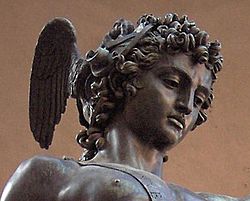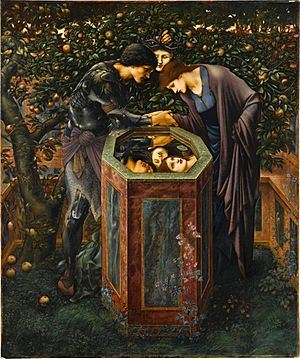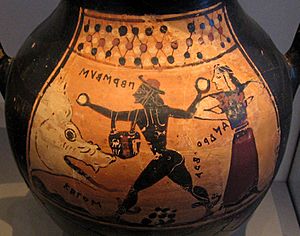Perseus facts for kids
Quick facts for kids Perseus |
|
|---|---|

Perseus with the Head of Medusa by Benvenuto Cellini (1554)
|
|
| Abode | Seriphus, then Argos |
| Symbol | Medusa's head |
| Personal information | |
| Consort | Andromeda |
| Children | Perses, Heleus, Alcaeus, Sthenelus of Mycenae, Electryon, Mestor, Cynurus, Gorgophone, Autochthe |
| Parents | Zeus and Danaë |
| Siblings | Several paternal half-siblings |
In Greek mythology, Perseus was a famous Greek hero known for defeating monsters. He was even famous before Heracles, another great hero. Perseus is most famous for cutting off the head of the Gorgon Medusa. He also rescued Andromeda from a scary sea monster called Cetus. Perseus was the son of Zeus, the king of the gods, and a mortal woman named Danaë. He was also a half-brother and great-grandfather to Heracles.
Contents
Perseus's Early Life
Birth and Prophecy
Perseus's story began in Argos. His mother, Danaë, was the daughter of King Acrisius. King Acrisius was sad because he didn't have a son. He asked the Oracle at Delphi for advice. The oracle told him that his own grandson, Danaë's son, would one day kill him.
To stop this, King Acrisius locked Danaë in a special bronze room. This room was open to the sky. But Zeus, who loved Danaë, visited her as a shower of gold. Soon after, Danaë gave birth to their son, Perseus.
Cast Adrift
King Acrisius was still afraid of the prophecy. He didn't want to anger the gods by killing Zeus's son. So, he put Danaë and baby Perseus into a wooden chest. He then cast the chest into the sea.
The chest floated to the island of Seriphos. There, a kind fisherman named Dictys found them. Dictys took them in and raised Perseus as his own son. Dictys's brother, Polydectes, was the king of the island.
Perseus and the Gorgon Medusa
A Dangerous Quest
When Perseus grew up, King Polydectes wanted to marry Danaë. Perseus didn't trust Polydectes and protected his mother. Polydectes then tricked Perseus into a dangerous quest.
Polydectes held a big party where everyone brought a gift. He asked for horses. Perseus didn't have a horse. He bravely told Polydectes he would bring any gift. Polydectes then demanded the head of Medusa.
Medusa was one of three sisters called the Gorgons. They had snakes for hair, sharp fangs, and golden wings. Anyone who looked into their eyes would turn to stone. Medusa was the only mortal Gorgon.
Help from the Gods
The goddess Athena helped Perseus. She told him to find the Hesperides, who had special weapons. Perseus first visited the Graeae, sisters of the Gorgons. These three old women shared one eye and one tooth. Perseus snatched their eye and held it until they told him where the Hesperides were.
The Hesperides gave Perseus a special bag called a kibisis to hold Medusa's head safely. Zeus gave him a super strong sword. Hades lent him a helm of darkness to become invisible. Hermes gave Perseus winged sandals to fly. Athena gave him a polished shield. She also told him which Gorgon was Medusa.
Defeating Medusa
Perseus flew to the Gorgons' cave. He found Medusa and her sisters sleeping. To avoid turning to stone, Perseus looked only at Medusa's reflection in his shiny shield. He carefully approached and cut off her head.
Medusa's sisters, Stheno and Euryale, chased Perseus. But he put on his helm of darkness and became invisible, escaping them. On his way back, Perseus met King Atlas. When Atlas refused him hospitality, Perseus showed him Medusa's head. King Atlas turned to stone and became the Atlas mountains.
Perseus and Andromeda

Rescuing Andromeda
On his flight home, Perseus stopped in the kingdom of Aethiopia. This land was ruled by King Cepheus and Queen Cassiopeia. Queen Cassiopeia had boasted that her daughter, Andromeda, was more beautiful than the Nereids (sea nymphs). This angered Poseidon, the god of the sea.
Poseidon sent a great flood and a terrible sea monster, Cetus, to destroy the land. An oracle said the only way to stop the monster was to sacrifice Andromeda to it. So, Andromeda was chained to a rock by the sea.
Perseus, wearing his winged sandals, saw Andromeda. He used Medusa's head to turn the monster Cetus into stone. He then freed Andromeda and asked to marry her.
Wedding and Return
Perseus married Andromeda, even though she had been promised to Phineus. At the wedding, a fight broke out. Perseus used Medusa's head again, turning Phineus and his followers to stone.
Andromeda followed Perseus to Tiryns in Argos. They had many children, and their family, the Perseidae, ruled Tiryns. After her death, Athena placed Andromeda among the stars as a constellation.
As Perseus flew over Libya, drops of Medusa's blood fell. These drops created many poisonous snakes in the desert. When Perseus returned to Seriphos, he found that Polydectes had been bothering his mother. Perseus used Medusa's head to turn Polydectes to stone. He then made Dictys, the kind fisherman, the new king of the island.
Fulfilling the Prophecy
The Oracle Comes True
Perseus returned his magical gifts to the gods. He gave Medusa's head to Athena, who placed it on Zeus's shield.
Perseus then went back to Argos. His grandfather, King Acrisius, heard he was coming. Remembering the prophecy, Acrisius left Argos and went to Thessaly. There, King Teutamides of Larissa was holding funeral games for his father.
Perseus competed in the discus throw. His discus accidentally flew off course and hit Acrisius, killing him instantly. This fulfilled the prophecy that Perseus would kill his grandfather.
King of Mycenae
After Acrisius's death, Perseus was next in line for the throne of Argos. However, he felt bad about killing his grandfather. So, he traded kingdoms with Megapenthes, who was king of Tiryns. Perseus became king of Tiryns.
Later, Perseus founded and strengthened the city of Mycenae. He built its strong walls. Perseus and Andromeda lived in Mycenae and had a long and successful reign as king and queen.
Perseus's Descendants
Perseus and Andromeda had seven sons: Perses, Alcaeus, Heleus, Mestor, Sthenelus, Electryon, and Cynurus. They also had two daughters: Gorgophone and Autochthe.
Their son Perses stayed in Aethiopia. He is believed to be the ancestor of the Persian people. Other descendants of Perseus ruled Mycenae, including Electryon and Eurystheus. The most famous descendant of Perseus was the great hero Heracles, who was the stepson of Amphitryon, son of Alcaeus.
Historians believe Heracles lived about four generations after Perseus. This means the family line went: Perseus, Electryon, Alcmena, and then Heracles.
| Family Tree: Descendants of Perseus and Andromeda | |||||||||
|---|---|---|---|---|---|---|---|---|---|
| Children | Perses | Alcaeus | Sthenelus | Heleus | Mestor | Electryon | Cynurus | Gorgophone | Autochthe |
| Grandchildren | Achaemenid Persians | Amphitryon, Anaxo, Perimede | Eurystheus, Alcyone, Medusa | – | Hippothoe | Alcmene, Stratobates, Anactor, Gorgophonus, Phylonomus, Celaeneus, Amphimachus, Lysinomus, Archelaus, Chirimachus, Licymnius | – | Aphareus, Leucippus, Tyndareus, Icarius | – |
| Great-Grandchildren | – | Melas, Argius, Oeonus | Admete, Perimedes, Alexander, Iphimedon, Eurybius, Mentor | – | Taphius | Heracles, Iphicles, Oeonus, Melas, Argius, | Mnesileos; Anogon; Cleopatra Alcyone; Iphigenia, Electra, Orestes, Chrysothemis, Laodice, Aletes, Erigone, Helen; Ladocus; Telemachus, Poliporthes, Acusilaus, Italus | – | |
| Fourth Generation Descendant | – | Iolaus | – | – | Pterelaus | Heraclides, Iolaus | Medon, Strophius; Tisamenus, Penthilus; Persepolis, Latinus, Poliporthes | – | |
Perseus in the Stars
Perseus is so famous that there is a constellation named after him. The legend says he was placed in the stars forever because he was so brave. You can see the Perseus constellation in the eastern sky during winter. It's near the bright stars Betelgeuse and Sirius. His wife's constellation, Andromeda, is also nearby.
The Perseus constellation contains interesting things like the variable star Algol. It also has deep sky objects such as Messier 34, the Double Cluster, and the California Nebula. There are eight named stars in the constellation. The famous Perseid Meteor Shower is also named after Perseus.
There's a whole family of constellations linked to the myth of Perseus. These include Andromeda, Cassiopeia, Cepheus, and Cetus. There's also a large group of galaxies called the Perseus cluster. One galaxy in this cluster, Caldwell 24, sends out strong radio and X-ray waves.
| Regnal titles | ||
|---|---|---|
| Preceded by Acrisius |
King of Argos |
Succeeded by Megapenthes |
| Preceded by Megapenthes |
King of Tiryns |
Succeeded by Electryon |
| Preceded by none (founder) |
King of Mycenae |
Succeeded by Electryon |
See also
- Lugh
- Lully
- Ibert (1921)
- Chimera
- Aethiopia
- The Story of Perseus and the Gorgon's Head, a short novel published in 1898
 In Spanish: Perseo para niños
In Spanish: Perseo para niños


